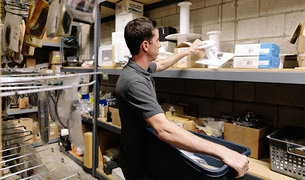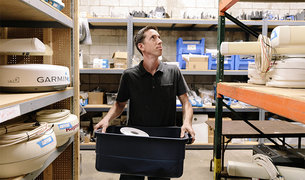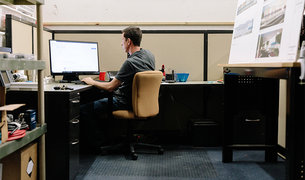Q: What is your advice for entrepreneurs starting out on eBay?
A: If you're just getting into eBay, and maybe you have a particular area that you're exploring, just run with it. Don't be afraid to take on a little risk and build on your success. When I started on eBay, I had some success up front and I took a chance. I quit my job, started a corporation, and moved into a warehouse all on a month. For me, that’s all I needed to get my foot off the ground.
Q: What insights do you use to determine what inventory to stock and list?
A: I have a pretty thorough understanding, of what items in my business are worth we generate those values based on previous sales that we have made and also previous sales that other sellers have made. We frequently refer to eBay's completed items filter it’s proven to be an extremely helpful tool for determining value and determining demand.
Q: How do you determine the right pricing for your inventory?
A: So when an item is going to be priced for eBay, the first thing we do is go back to the completed listings tool which gives us a barometer of what some of our inventory is worth. If the item does not show up on completed listings, then we go to the Internet and we look at what these are selling for new. If we’re dealing with an item that is not a new product, or if the item is an obsolete product, then it gets a little more challenging and we have to make an educated guess. Each year, we go through our listings and reduce pricing on anything that's been a slow seller.
Q: What changes do you make to your inventory or pricing if your items aren’t selling?
A: Occasionally we’ll have inventory that is slow moving, so with those we’ll sometimes take a lower price or a lower offer than we usually would in order to clear it off the shelves. We’ll then apply that money towards other more profitable inventory.
Q: What tips do you have for clearing out slow moving inventory?
A: If we have a slow selling inventory item, we will make sure we don't have too many of those. And if they come through the door or if we are buying them, we will not pay as much money for them. I would say the first thing to do if you have slow moving inventory is to look at what other people are selling that stock for. Always monitor your inventory, always check what the market value is for something, and don't be afraid to sell it—even if it's at a loss.
Q: How does your business handle seasonality?
A: By being an international seller, we are able to even out the seasonality of business because we can ship worldwide. We’ve sold to Fiji, Australia, New Zealand, almost every European country, South America, Central America, and Africa. In the States, we do more business in the spring and summer and it dies down in the fall and winter. But with others in the southern hemisphere, the seasons are reversed so we do a lot more shipping to those countries, our fall and winter. And then we do a lot of shipping to countries in the northern hemisphere in the spring and summer.

















